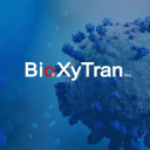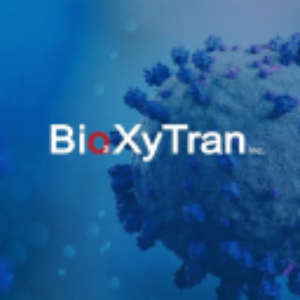Welcome to our dedicated page for Bioxytran news (Ticker: BIXT), a resource for investors and traders seeking the latest updates and insights on Bioxytran stock.
Bioxytran, Inc. (BIXT) is a clinical-stage biotechnology company whose news flow centers on antiviral drug development, oxygen transport therapies, and advances in stroke and Alzheimer’s research. Company press releases describe a pipeline that includes ProLectin-M, PHM23, and BXT-25, along with collaborations and scientific milestones that support these programs.
News updates frequently highlight clinical trial progress for ProLectin-M, an oral galectin antagonist antiviral being developed under an active IND with the FDA. Bioxytran has reported completion of randomized, double-blind, placebo-controlled trials and dose optimization studies, with endpoints focused on viral load reduction, symptom improvement, and safety. Releases also discuss regulatory interactions with agencies such as the FDA and India’s Central Drugs Standard Control Organization for future trial design.
Another recurring theme in Bioxytran’s news is its oxygen therapeutics platform. The company issues updates on BXT-25 and the Universal Oxygen Carrier project, including securing a GMP-quality source of camel hemoglobin through a joint venture with the Heme Foundation. Articles describe how this work ties into research on mitochondrial function, tissue oxygenation, and the use of the MDX Viewer as a real-time diagnostic tool in stroke and neurodegenerative disease studies.
Bioxytran’s news also covers scientific recognition and partnerships, such as the inclusion of its antiviral PHM23 in a University of Georgia grant submission for Bird Flu research, and publications by scientific advisors on oxygen homeostasis and brain models of ischemic stroke. In addition, the company has announced initiation of independent research coverage of its stock, reflecting interest from micro-cap and small-cap equity research specialists.
Investors and observers who follow BIXT news can expect updates on clinical trial milestones, regulatory submissions, scientific publications, collaborations with academic and nonprofit partners, and developments in its galectin-based antiviral and oxygen transport platforms.
Bioxytran (OTCQB: BIXT) reported positive Phase 2 results for orally administered ProLectin-M in 38 subjects with acute viral infection. The trial showed 100% viral RNA non-detection by Day 7 (p=0.001), no viral rebounds during a 14-day post-treatment observation, and informed a four-tablet-per-day dose selection for late-stage development.
Bioxytran (OTCQB:BIXT) announced that CEO David Platt, Ph.D. will present at Noble Capital Markets' Emerging Growth Virtual Equity Conference on February 5, 2026. The presentation includes a fireside Q&A and will overview corporate strategy, pipeline focus, and previously disclosed clinical and regulatory progress.
A video webcast will be available after the event and archived on the company website and Channelchek.com for 90 days.
Bioxytran (OTCQB: BIXT) executed a Sponsored Research Agreement with the University of Minnesota to study polysaccharide and oligosaccharide interactions using advanced nuclear magnetic resonance (NMR) methods under Dr. Kevin Mayo. The program runs through early 2027 with milestones, funding for personnel and NMR access, and university IP ownership with broad data rights for Bioxytran.
The collaboration aims to deepen structural understanding of carbohydrate-binding interactions to inform Bioxytran's therapeutic and diagnostic R&D pathways.
Bioxytran (OTCQB:BIXT) issued a corporate update on January 29, 2026 highlighting progress across its ProLectin‑M antiviral program, an active U.S. FDA IND, dose-optimization completion, and work on an oxygen-transport platform including a joint venture with the Heme Foundation.
The release reiterates prior milestones: completion of a randomized, double-blind, placebo-controlled ProLectin‑M trial in October 2025, dose-optimization work in May 2025, a July 2024 JV for a universal oxygen carrier, and a January 2025 cancer-focused galectin‑3 preprint.
Bioxytran (OTCQB:BIXT) announced on Nov 13, 2025 that Independent Research initiated coverage of the stock and published a report highlighting clinical and corporate updates.
Key clinical data for lead candidate ProLectin-M: 88% viral clearance by day 3 and 100% by day 7 in mild-to-moderate COVID-19, with no serious adverse events reported. The drug targets the galectin fold and is positioned as a potential broad-spectrum antiviral.
Pipeline focus includes ambulatory stroke candidate BXT-25 aimed at expanding the 3-hour treatment window. The report flags funding as the primary risk and notes >50% insider ownership and active pursuit of strategic partnerships.
Bioxytran (OTCQB: BIXT) announced on October 29, 2025 the completion of a randomized, double-blind, placebo-controlled dose-optimization trial for its oral broad-spectrum antiviral candidate ProLectin-M. The company says prior Phase 2 results showed treated participants reached undetectable PCR viral levels in less than one week. Data from the new trial will be used to inform a phase 3 trial design for CDSCO and will be submitted to the FDA at the agency's request. Bioxytran expects to compile detailed safety and efficacy endpoints for peer-reviewed publication and plans to submit full results in the coming weeks.
Bioxytran (OTCQB: BIXT) announced a significant scientific advancement with the publication of a groundbreaking book by Prof. Avraham Mayevsky on tissue oxygenation and mitochondrial function. The research highlights the limitations of current peripheral oxygen measurements and introduces a paradigm shift towards tissue-specific oxygenation monitoring.
The company's MDX Viewer technology, combined with their Universal Oxygen Carrier (UOC) and BXT-25 development programs, aims to revolutionize treatment approaches for conditions like stroke and Alzheimer's disease. The technology will serve as a crucial biomarker in upcoming BXT-25 clinical trials, potentially transforming how oxygen delivery is measured and managed in critical conditions.
Bioxytran (OTCQB: BIXT) has announced significant progress in developing ProLectin-M, its broad-spectrum antiviral drug. The company has completed dosing in its dose optimization clinical trial, marking a crucial milestone in the drug's development.
ProLectin-M targets galectin fold on viral spike proteins and has shown impressive clinical results: 100% response rate (negative PCR tests) by day 7 and 88% response rate by day 3 in double-blinded placebo-controlled trials. The drug has demonstrated effectiveness against SARS-CoV-2, influenza, and RSV, with no viral rebounds during the 14-day observation period.
The drug's development, supported by an active FDA IND application, utilizes proprietary linear complex carbohydrate structures designed with nuclear magnetic resonance and AI to neutralize viral infectiousness.


